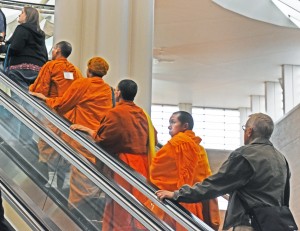[Author’s Note: This post deals with currently controversial intersections between religion and politics. I share it with you all not to create disagreement or strife, but because I think it’s important to cogently work through these situations together and because I think they’re illustrative of a deeper issue within the American public square.]
In interfaith, it’s all too easy to see another’s point of view during a conversation. I don’t have to agree with a dialog partner, but I can usually come to understand them despite our disagreements. This is, I think, a skill that must be honed; it’s not something that always comes naturally.
So, when I struggle to see things from another’s point of view, I often find myself returning to the problem over and over again until I find some means by which to reconcile things for myself. For the last few months, I’ve been engaged—largely silently—in such a struggle around the question of religious discrimination especially as it relates to the Affordable Care Act’s contraceptive mandate and various impacts of marriage equality.
I suppose I should state for the record that I understand that these are hot button issues. Browse through the channels from other faiths here at Patheos and you can find more than a few articles relating to these topics, as well as others focused on religious discrimination. I hope that others who disagree with what I’m about to say come forward and are willing to discuss things with me in the comments below because I’ve taken things about as far as I can on my own.
To state my views frankly: these laws are not discriminatory.
I think we’ve begun to lose the distinction between disagreement and discrimination. What I mean is this: just because I disagree with a law neither makes that law discriminatory toward me nor toward people like me. Noise ordinances, for example, are pretty commonly used in residential areas to help cut down on the decibels after a certain point in the evening. If you’re throwing a party, you might disagree with your neighbors if they call the cops on you, but your neighbors aren’t discriminating against you by trying to get you to lower the volume a bit.
More seriously, I think that someone can disagree with a law without that law being discriminatory. Discrimination involves the creation of something other than a level playing field in which a portion of the population is favored or protected when compared against another one. This can happen either based on the actual language of the regulation (e.g. the segregation laws of the South) or through its application (e.g. New York’s stop and frisk laws, which are arguably written in non-discriminatory way but are applied overwhelmingly against minorities within the city).
I wonder, though, that my own agreement with laws protecting or granting marriage equality colors my opinions; because I see our efforts in a positive light, I am therefore less likely to understand others’ opposition to them. For example, I’m sure the argument has been made that such a law protects homosexuals at the expense of heterosexuals—especially conservative heterosexuals. But, I don’t see it that way—and more trouble for me, I struggle to find any validity in this point of view. Instead, I see these laws as working toward the creation of a level field between these two groups. Laws, like the Defense of Marriage Act (a.k.a. DOMA), created an imbalance that we seek at this time to redress and the disagreement with that effort does not amount to discrimination.
I worry over the stories we hear, however, of times when anti-discrimination laws are used infringe on the exercise of others’ religious beliefs. We’ve seen stories of business owners refusing service to homosexual couples because of their religious opposition to homosexuality or seeking to avoid providing contraceptives to their employees for the same reasons. But can businesses exercise a religion? Is it appropriate for an employer to make decisions based on their religious beliefs for employees who may not share them? I would answer in the negative to both of these items, but I know that there are many others who think otherwise.
I wish we lived in a world where these sorts of entanglements no longer existed but we’re not there yet. We even see cases many thought long settled brought to the surface by nothing more than a Cheerios commercial highlighting an interracial couple, proving not only the similarities between the disagreements of today and those of decades past, but that these disagreements are not easily resolved. Considering prejudice remains with us despite our efforts to move beyond it, I suspect that these struggles are meant to temper us and to force us to continue to seek to resolve our differences in spite of, or perhaps because of, the difficulty in doing so.
I think it’s time that we who have honed our ability to struggle with these issues, who are willing to try and see things from another’s point of view, begin to talk about them more openly. To struggle together with counterparts willing to do the same. We spend too much time these days talking at each other; on the news, in the comments online.
I hope it’s time that we can start talking to each other instead.











